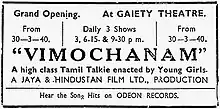Vimochanam
Vimochanam (transl. Salvation) is a 1940 Indian Tamil-language film dealing with the issue of prohibition. Directed by T. Marconi, the film stars Hemalatha, Kanthamani, Baby Jaya, Indira and Bhagirathi. Released on 30 March 1940, it received significant attention because of the values it propagated, and the fact that most of the artistes were girl children. No print or stills of this film are known to survive, making it a lost film.
| Vimochanam | |
|---|---|
 Theatrical release poster | |
| Directed by | T. Marconi |
| Written by | Sasi |
| Starring | Hemalatha Kanthamani Baby Jaya Indira Bhagirathi |
| Cinematography | T. P. Chauhan |
| Music by | Ramani Sarma Brothers (background music) |
Production companies | Jaya Films Hindustan Films |
Release date |
|
Running time | 160 minutes[1] |
| Country | India |
| Language | Tamil |
Plot
Arumugham, a drunkard living in Salem, sells his wife's jewellery to purchase alcohol until probation in Salem offers much-needed relief. He is soon arrested for illegally trying to brew liquor. After he is released, he finds the liquor shop has become a tea-stall and his wife destitute, leading to his reform.[2][1]
Production
Vimochanam was a pro-prohibition magazine published by politician C. Rajagopalachari from his Ashram at Tiruchengode. Inspired by Rajagopalachari's anti-alcohol crusade, a film sharing its name with the magazine, starring mainly girl children belonging to the Chennai Sirumigal Sangeetha Vidyasaalai, was launched. The film was written by short story writer Sasi while T. Marconi, an Italian who was then living in Madras, directed the film. Art direction was handled by D. S. Ghadgaonkar,[2] and cinematography by T. P. Chauhan.[3] The film was jointly produced by Jaya and Hindustan Films.[1]
Soundtrack
The soundtrack was composed by Ramani, the founder of the Ramani School of Music, while Sasi wrote the lyrics.[2][3] The background score was composed by Sarma Brothers. The film had many songs performed by Carnatic musician Lalitha Venkataraman. Popular songs include "Kallai Ozhithida Sattamondru Chennai Congress Aatchiyil Seithanarey", "Mahaan Rajaji-yai Ellorum Vaazhthuvomey" and "Naattuomey Jayakodi".[2] The songs were released by Odeon Records.[4]
Release and reception
Vimochanam was released on 30 March 1940.[3][4] The Indian Express called it "a first-class story acting as excellent propaganda for prohibition."[5] Film historian Randor Guy said the film received significant attention because of the values it propagated, and the fact that most of the artistes were girl children. He said it would be remembered for its "meaningful lyrics, presentation and all roles being played by girl children." No print or stills of this film are known to survive, making it a lost film.[2]
References
- Rajadhyaksha, Ashish; Willemen, Paul (1998) [1994]. Encyclopaedia of Indian Cinema. British Film Institute and Oxford University Press. p. 283. ISBN 0-19-563579-5.
- Guy, Randor (25 March 2010). "Vimochanam (1939)". The Hindu. Archived from the original on 4 January 2017. Retrieved 16 July 2012.
- "1939-1940 – விமோசனம் – ஜெயா – இந்துஸ்தான்". Lakshman Sruthi (in Tamil). Archived from the original on 25 January 2020. Retrieved 8 February 2020.
- "Vimochanam". The Indian Express. 30 March 1940. p. 3. Retrieved 8 February 2020.
- "Gaiety". The Indian Express. 30 March 1940. p. 3. Retrieved 19 February 2021.
External links
- Vimochanam at IMDb
- Raajaajiyai Ellorum on YouTube - song paying tribute to Rajagopalachari and his services for the uplift of the poor sung by Bhagirathi and T. P. Sundari